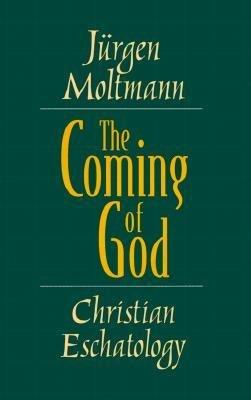
Jurgen Moltmann's "The Coming of God: Christian Eschatology"
Jürgen Moltmann's critique of mainline evangelicalism's explanation of justification demonstrates a serious problem with common presentations of the gospel. If salvation ultimately comes down to a person's decision according to their own free will, then how is this explanation any different than Atheism? It excludes any saving action by God, and makes man the sole determiner of his fate: Yes or No. Consider the following quotation from Jürgen Molmann's "The Coming of God: Christian Eschatology". It's an excellent book. The Reformed Church's Doctrine of Election puts the saving action back into the unilateral action of God to save individuals and is not harmed by this critique. However, the implication is that a Semipelagian Gospel is an impossible to reconcile with the Gospel of God.
In modern theology, the distinction is often made by saying: if you believe, you can have this hope; if you don't, you can't. Only believers are 'hidden in Christ' and will be with him in the future of his kingdom. Those who don't believe, or who rest their personal hope on something or someone different, will not see Christ's future. To each his own. All human beings must not be turned into Christians against their will post mortem.
The Lausanne Covenant of evangelical theologians says: "Those who reject Christ repudiate the joy of salvation and condemn themselves to eternal separation from God." They will therefore not only be damned by God. They also damn themselves. Is this theologically conceivable? Can some people damn themselves, and others redeem themselves by accepting Christ? If this were so, God's decisions would be dependent on the will of human beings. God would become the auxiliary who executes the wishes of people who decide their fate for themselves. If! can damn myself, I am my own God and judge. Taken to a logical conclusion this is atheistic. There is a more modern evangelical idea about a conditional immortality, according to which no one finds a life after death without believing and unless God confers eternal life; all the rest simply remain dead. But I do not find this very helpful either, because it excludes God's judgment. Mass murderers might possibly welcome this solution, because they would then not have to answer before God's judgment for what they had done. The annihilationists think that unbelievers do not go to hell eternally but are simply destroyed and fall into an eternal nothingness; but this too does not seem to me compatible with the coming omnipresence of God and his faithfulness to what he has created. For the lost to 'disappear' conforms to the terrible experiences with the murder squads in military dictatorships, but it does not accord with God. The God of the Bible is the Creator, not simultaneously the Destroyer, like the Indian god Shiva."'
~ Jurgen Moltmann, The Coming of God, pg109,
http://books.google.com/books?id=OtyDgOLxfvIC&lpg=PP1&pg=PA109#v=onepage&q&f=false
Here is the Lausanne Covenant quotation in context:
3. THE UNIQUENESS AND UNIVERSALITY OF CHRIST
We affirm that there is only one Saviour and only one gospel, although there is a wide diversity of evangelistic approaches. We recognise that everyone has some knowledge of God through his general revelation in nature. But we deny that this can save, for people suppress the truth by their unrighteousness. We also reject as derogatory to Christ and the gospel every kind of syncretism and dialogue which implies that Christ speaks equally through all religions and ideologies. Jesus Christ, being himself the only God-man, who gave himself as the only ransom for sinners, is the only mediator between God and people. There is no other name by which we must be saved. All men and women are perishing because of sin, but God loves everyone, not wishing that any should perish but that all should repent. Yet those who reject Christ repudiate the joy of salvation and condemn themselves to eternal separation from God. To proclaim Jesus as "the Saviour of the world" is not to affirm that all people are either automatically or ultimately saved, still less to affirm that all religions offer salvation in Christ. Rather it is to proclaim God's love for a world of sinners and to invite everyone to respond to him as Saviour and Lord in the wholehearted personal commitment of repentance and faith. Jesus Christ has been exalted above every other name; we long for the day when every knee shall bow to him and every tongue shall confess him Lord. (Gal 1:6-9; Rom 1:18-32; 1 Tim 2:5,6; Acts 4:12; John 3:16-19; 2 Pet 3:9; 2 Thess 1:7-9; John 4:42; Matt 11:28; Eph 1:20,21; Phil 2:9-11)
Related: Atheism, Jürgen Moltmann, Lausanne Covenant, The Coming of God, The Coming of God: Christian Eschatology



Leave a comment